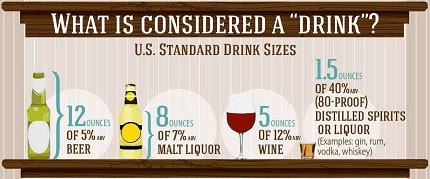Good news for those who are breastfeeding—you can take in an extra 330 to 400 calories a day! That extra sustenance will give you enough energy and nutrients to produce milk for your new baby.
However, there are a few drinks and foods you should limit or try to avoid altogether.
- Alcohol: Zero alcohol for moms is the safest option for baby. Because if someone consumes too much alcohol and breastfeeds, it can cause negative growth and development for the baby.
A “drink” of alcohol is OK one time a day, especially after waiting at least two or three hours after drinking before breastfeeding. Here is what’s considered a “drink” of alcohol:

Source: Centers for Disease Control and Prevention
- Caffeine: Want baby to get in a good sleep rhythm? Limit your caffeine intake or avoid it altogether.
Limit caffeine to 16 to 24 ounces a day, which is about 2-3 cups. And keep in mind that caffeine isn’t just in soda and coffee. It’s also in chocolate or tea.
If you do consume caffeine, try to wait until after your breastfeeding session finishes. It takes 2-3 hours for the caffeine to pass through your bloodstream. If you do that, by the time baby is ready for the next feeding, you should be good to go. - Fish with higher levels of mercury: Found in varying levels in fish, mercury passes through breast milk to the infant, with too much mercury exposure possibly affecting the development of the baby’s nervous system.
There’s no way to “cook off” the mercury in fish. However, you can limit the amount of mercury by sticking to smaller sized fish, like scallops and sardines. Avoid larger fish like king mackerel, marlin, shark, and swordfish.
Check out the FDA’s full list of good and bad fish choices while breastfeeding.
There’s no need to drastically change your diet when you start breastfeeding. Baby expects the same foods and drinks you consumed while in the womb. Just continue to make healthy choices like avoiding or limiting alcohol, caffeine, and certain types of fish.


